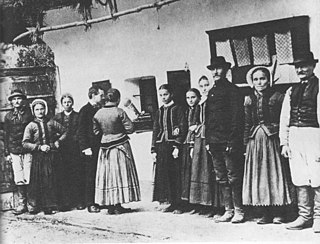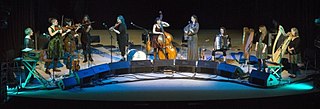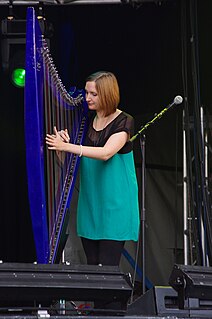Related Research Articles

Folk music is a music genre that includes traditional folk music and the contemporary genre that evolved from the former during the 20th-century folk revival. Some types of folk music may be called world music. Traditional folk music has been defined in several ways: as music transmitted orally, music with unknown composers, music that is played on traditional instruments, music about cultural or national identity, music that changes between generations, music associated with a people's folklore, or music performed by custom over a long period of time. It has been contrasted with commercial and classical styles. The term originated in the 19th century, but folk music extends beyond that.

The folk music of England is a tradition-based music which has existed since the later medieval period. It is often contrasted with courtly, classical and later commercial music. Folk music traditionally was preserved and passed on orally within communities, but print and subsequently audio recordings have since become the primary means of transmission. The term is used to refer both to English traditional music and music composed or delivered in a traditional style.

Scottish folk music is music that uses forms that are identified as part of the Scottish musical tradition. There is evidence that there was a flourishing culture of popular music in Scotland during the late Middle Ages, but the only song with a melody to survive from this period is the "Pleugh Song". After the Reformation, the secular popular tradition of music continued, despite attempts by the Kirk, particularly in the Lowlands, to suppress dancing and events like penny weddings. The first clear reference to the use of the Highland bagpipes mentions their use at the Battle of Pinkie Cleugh in 1547. The Highlands in the early seventeenth century saw the development of piping families including the MacCrimmons, MacArthurs, MacGregors and the Mackays of Gairloch. There is also evidence of adoption of the fiddle in the Highlands. Well-known musicians included the fiddler Pattie Birnie and the piper Habbie Simpson. This tradition continued into the nineteenth century, with major figures such as the fiddlers Niel and his son Nathaniel Gow. There is evidence of ballads from this period. Some may date back to the late Medieval era and deal with events and people that can be traced back as far as the thirteenth century. They remained an oral tradition until they were collected as folk songs in the eighteenth century.

A cèilidh or céilí is a traditional Scottish or Irish social gathering. In its most basic form, it simply means a social visit. In contemporary usage, it usually involves dancing and playing Gaelic folk music, either at a house party or a larger concert at a social hall or other community gathering place.
Cornwall is a Celtic nation with a long musical history. Strengthened by a series of 20th century revivals, traditional folk music has a popular following. It is accompanied by traditions of pipers, brass and silver bands, male voice choirs, classical, electronic and popular music.

Battlefield Band were a Scottish traditional music group. Founded in Glasgow in 1969, they have released over 30 albums and undergone many changes of lineup. As of 2010, none of the original founders remain in the band.
Martyn Bennett was a Canadian-Scottish musician who was influential in the evolution of modern Celtic fusion, a blending of traditional Celtic and modern music. He was a piper, violinist, composer and producer. He was an innovator and his compositions crossed musical and cultural divides. Sporting dreadlocks at the height of his performing career, his energetic displays led to descriptions such as "the techno piper". Diagnosis of serious illness at the age of thirty curtailed his live performances, although he completed a further two albums in the studio. He died fifteen months after release of his fifth album Grit.

The Peatbog Faeries are a largely instrumental Celtic fusion band. Formed in 1991, they are based in Dunvegan on the Isle of Skye, Scotland.
The Scots Trad Music Awards or Na Trads were founded in 2003 by Simon Thoumire to celebrate Scotland's traditional music in all its forms and create a high profile opportunity to bring the music and music industry into the spotlight of media and public attention. Nominations are made by the public and in 2019 over 100,000 public votes were expected across 18 categories.

Malinky is a Scottish folk band specialising in Scots song, formed in autumn 1998.
Maeve Mackinnon is a Scottish folk singer. Originally from Glasgow, she performs primarily in Scottish Gaelic, and also in English. She is also one of two Gaelic singers who share the same name.
The British folk revival incorporates a number of movements for the collection, preservation and performance of folk music in the United Kingdom and related territories and countries, which had origins as early as the 18th century. It is particularly associated with two movements, usually referred to as the first and second revivals, respectively in the late 19th to early 20th centuries and the mid-20th century. The first included increased interest in and study of traditional folk music, the second was a part of the birth of contemporary folk music. These had a profound impact on the development of British classical music and in the creation of a "national" or "pastoral" school and led to the creation of a sub-culture of folk clubs and folk festivals as well as influential subgenres including progressive folk music and British folk rock.
Mairi Campbell is a Scottish folk singer and musician. Campbell's songs and music have a rooted and powerful quality that range from the everyday to the universal, both in sound and subject matter.

Aidan O'Rourke is a Scottish contemporary folk music fiddle player and composer. He was named the 2014 BBC Radio 2 Folk Awards Musician of the Year and the Scots Trad Music Awards 2011 Composer of the Year. In addition to his solo career, O'Rourke also plays in the award-winning folk trio Lau alongside Kris Drever and Martin Green. He was one of 20 musicians commissioned for New Music 20x12 by PRS for Music Foundation to celebrate the 2012 Summer Olympics. O'Rourke has worked with Eddi Reader, Andy Sheppard, Alyth, Roddy Woomble and appears on more than eighty recordings. Previously, he was a member of Blazin' Fiddles, The Unusual Suspects and Tabache.
Davy Steele was a Scottish folk musician and songwriter. He sang with Drinkers Drouth, Ceolbeg, and was a founding member of the Scottish folk supergroup Clan Alba. In 1998, Steele joined the Battlefield Band as lead vocalist and guitarist, and he also played the bouzouki and bodhrán. He was married to Patsy Seddon, a founding member of The Poozies. They had one child together and Steele had three more children from an earlier marriage. Steele was diagnosed with a brain tumor and died on April 11, 2001, in a hospice in Edinburgh.

Songs of Separation was a music project created in the aftermath of the 2014 Scottish independence referendum to explore through the medium of music ideas of separation. It was organised by double-bass player Jenny Hill and brought together ten female folk musicians from Scotland and England for one week in June 2015 on the Isle of Eigg. The resulting album won the "Best Album" category in the 2017 BBC Radio 2 Folk Awards.

Jenn Butterworth is an acoustic folk guitarist and singer based in Glasgow, Scotland, who was awarded the title "Musician of the Year" at the 2019 Scots Trad Music Awards, and was nominated for the same title at the 2019 BBC Radio 2 Folk Awards. She was a founder member of Kinnaris Quintet, who won the Belhaven Bursary for Innovation in Scottish Music at the 2019 Scots Trad Music Awards.
The BBC Radio Scotland Young Traditional Musician competition has run annually since 2001. It exists to encourage young musicians to keep their tradition alive and to provide performance opportunities, tools and advice to help contestants make a career in traditional music. Former winners include Hannah Rarity, Mohsen Amini, Robyn Stapleton, Shona Mooney and Emily Smith.

Rachel Newton is a Scottish singer and harpist. As well as playing both acoustic and electric harp she also plays viola, fiddle, piano and harmonium. She performs solo as well as in the bands The Shee, The Furrow Collective and Boreas and was formerly a member of the Emily Portman Trio. She was a member of the Lost Words Spell Songs project and is a co-founder of The Bit Collective, a group campaigning for equality in folk music.

Iona Fyfe is a Scottish singer from Huntly, Aberdeenshire known for singing Scots folk songs and ballads. In 2016, she was a semi-finalist of the BBC Radio 2 Young Folk Award and, in 2017 and 2021, was a finalist of the BBC Radio Scotland Young Traditional Musician award. In 2018, she won "Scots Singer of the Year" at the MG ALBA Scots Trad Music Awards. In 2019, she won "Young Scots Speaker o the Year" at the inaugural Scots Language Awards, winning "Scots Performer o the Year" in the 2020 Awards, and "Scots Speaker o the Year" in the 2021 Awards. She has advocated for official recognition of the Scots language, successfully petitioning Spotify to add Scots to their list of languages.
References
- ↑ English dance and song English Folk Dance and Song Society - 1994
- ↑ Performance and production John Shepherd - 2003 - Page 298
- ↑ International Who's Who in Popular Music 2002 - Page 505